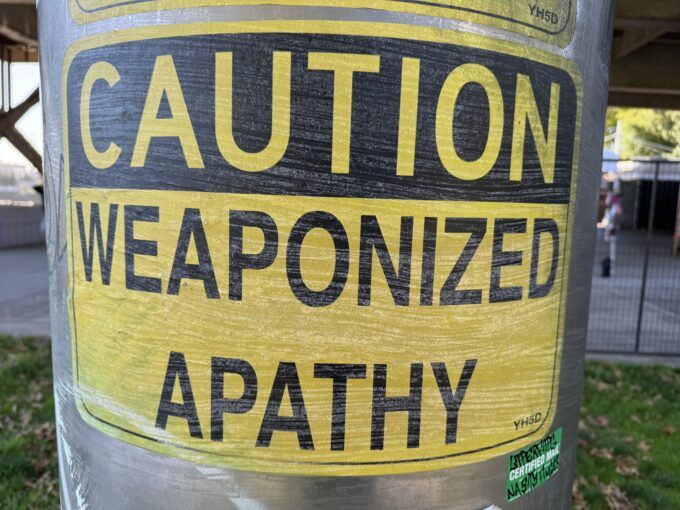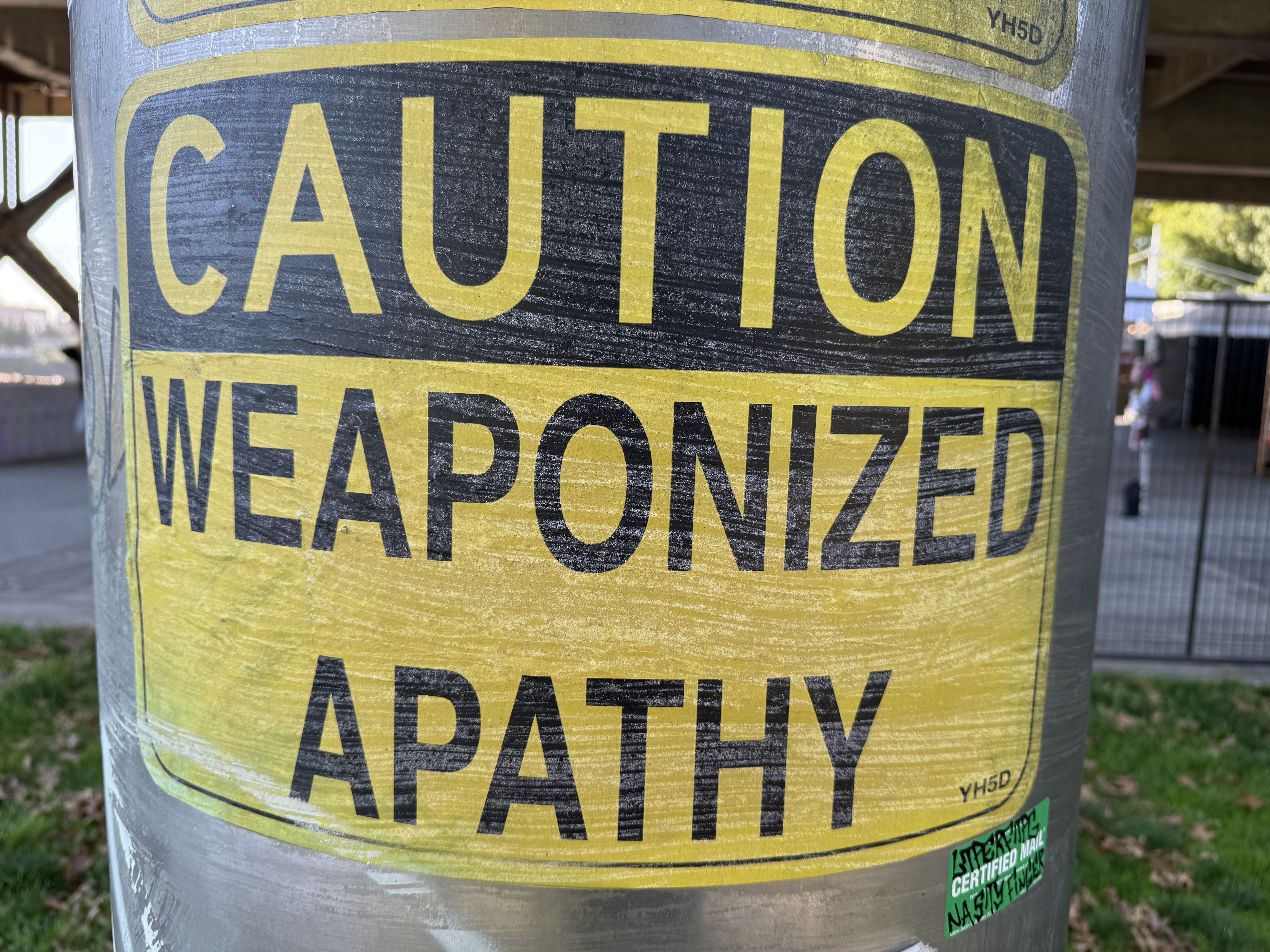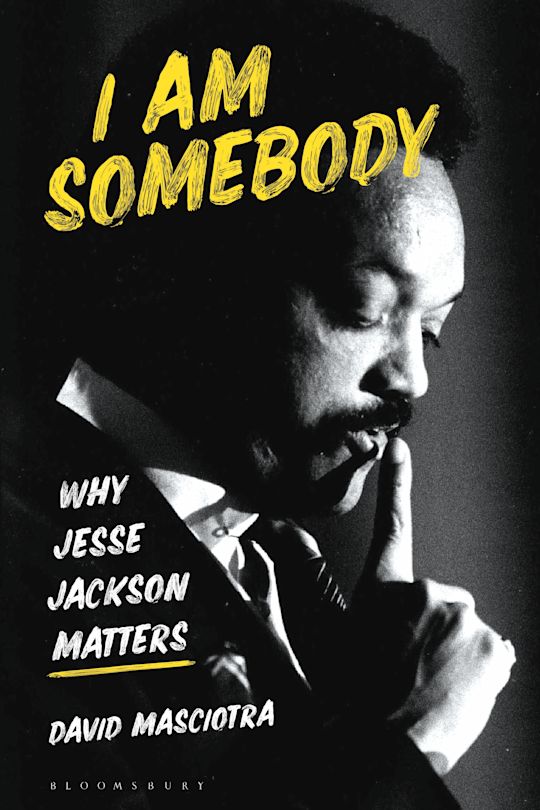






























































Photograph by Nathaniel St. Clair
I’ve conducted an unfortunate and unwanted experiment over the past eight months. I’ve mentioned death and grief to friends, family, and acquaintances. Since my wife and I lost one of our closest friends (Alanna Ford, a member of Jesse Jackson’s staff at Rainbow/PUSH, who I wrote about for CounterPunch), countless people, in casual exchanges that demand nothing more than inquiries as etiquette, and relatives and other friends, in more focused moments, have asked, “How are you doing?”
The pedestrian question invites an odd social dance. There are moments when it is obvious, such as passing a coworker in the hallway or bumping into a neighbor on a shared sidewalk, that upbeat brevity is mandatory. Even if one were undergoing personal torture not seen since the Biblical days of Job, a simple “good” should suffice. As the old television advertisement slogan put it, “Anything less” – or, in this case, more – “would be uncivilized.” Then, there are times when the context and relationship should indicate that an honest conversation of substance and depth is possible – the family gathering or lunch with a friend of many years. In recent days, I’ve found myself, initially in good faith, answering the “how are you doing” line with some summary of Alanna’s death, typically punctuating the sad story with a declaration of grief. “It’s a devastating loss,” I’ll often remark. There are notable exceptions for whom I’m grateful, but in most cases – in fact, the overwhelming majority – people will respond with as few words as possible, often while displaying signs of visible discomfort. They squirm in their seat, shift their eyes to a corner of the ceiling, or suddenly start playing with their food in the fashion of toddlers, while uttering barely audible platitudes. “I’m sorry,” “That’s terrible,” or sometimes only grunts and moans seemingly meant to indicate an acknowledgement of pain: “Ah,” “Oh, man.”
Because I’m a journalist by trade, I’m accustomed to and comfortable with asking questions, meaning that my story often enters the conversation twenty or thirty minutes after I’ve listened to my discussion partner describe, at length and in detail, everything from work-related woes to upcoming travel plans and itinerary. No matter how many follow up questions I ask or brief, uninteresting comments I offer, the speaker never stops talking, barely pausing to take a sip of beer or bite of a sandwich. I’ll silently contemplate how much the experience resembles the interviews that I’ve conducted, only with the difference that no one will eventually pay me to report on the conversation. Instead, I’m having to pay my half of the number in the billfold to have the experience.
The Guardian recently ran a story on the growing mutation of the “non-asker,” a social creature that, for reasons of narcissism, extreme obliviousness, or a combination of both, does not ask his or her conversational partner any questions about anything. Instead, the non-asker treats conversation like he would the chair, microphone, and headset in a radio booth. They are there to broadcast their interests, opinions, and grievances. Gore Vidal commented in the 1990s that he found perverse delight in eavesdropping on the conversations of “fellow Americans,” finding that they only exchanged stories about themselves. The historian Morris Berman, after writing a prescient trilogy of books on American decline, moved to Mexico for political and personal reasons. In the latter category, he included most people’s unwillingness to participate in conversations of any depth, especially if they veered into allegedly uncomfortable topics.
There is no topic that makes Americans more pretend-to-adjust-their-clothing, search-for-the-nearest-linguistic-exit uncomfortable than death. Because Alanna’s death constituted the first major loss of my adult life, it also invited the new experience of trying to talk to people about death. Those failed attempts have elicited reactions that make me ponder if sociopathy is the defining characteristic of American life. One friend merely slouched in his chair, slowly nodding, unable to utter a word, before changing the subject to what he was planning to order for lunch. He went with a grilled chicken wrap. At a recent family gathering, two relatives asked me if I’ve recently spent time with Jesse Jackson. I answered that he was at Alanna’s funeral, and then explained that Alanna was on his staff and a “very dear friend” to my wife and me. One of the relatives remained silent, while the other asked me for a book recommendation of Norman Mailer’s political journalism. I suggested Armies of the Night.
Unlike the non-askers and the blank-eyed mutes, there are a few who have managed the bare minimum. One friend patted my shoulder and said, “I’m sorry, bud,” as if a scoop of vanilla from my ice cream cone fell on the floor. In subsequent conversations, he’s never referred to my friend, Alanna, or asked in a sincere rather than perfunctory tone, “How are you doing?”
It is easy, especially when reenacting one of these unpleasant exchanges for my wife, to turn tragedy into comedy. My friend’s nod, for example – a slight grimace with crunched chin, head moving up and down at a slow, steady pace – has become something of an inside joke; an emblematic gesticulation of American indifference. More on this later, but the nod captures a collective reaction that has become all too common here in the weakening Empire and dwindling Superpower. Another mass shooting? Just nod in silence. A president who ignores the Supreme Court to ship Latino refugees to an El Salvadoran gulag? Just move your noggin up and down like a ballpark giveaway bobblehead.
The truth of the matter, despite the humorous notes, is that these exchanges are hurtful. They make me feel disconnected from the people in front of me, resulting in, simultaneously, a feeling of association with, what the late David Foster Wallace, called, “anomie and solipsism and a peculiarly American loneliness.”
Although I am not as well-traveled as I’d like to be, the aversion to the tragic and uncomfortable does seem peculiarly American. Berman found that his Mexican friends were far more willing and even committed whenever sad topics entered the conversational air. It is not difficult to imagine that a culture that has cultivated the “Day of the Dead” multi-day holiday to gather in cemeteries for a celebration and commemoration of the deceased might include people who demonstrate greater ease when considering and confronting mortality. Kevin Toolis writes in My Father’s Wake about how the Irish approach to mourning is much more honest, mature, and therefore, healing than what he has observed in the US. Vietnamese novelist and poet, Ocean Vuong, recently told an interviewer that he remains bewildered by the consistency of Americans asking him how he writes about topics that are painful.
He explained, “In Vietnam, Buddhism teaches that life is suffering. We know it’s hard. We don’t expect ease—we try to understand suffering, work through it, maybe even transcend it. We recognize that darkness makes the light visible. You need one to see the other. In America, that’s still perplexing. Suffering feels like something to avoid, to escape.”
Beyond the anecdotal, there is a growing body of research suggesting that Americans cower from anything potentially unnerving, even if it means behaving like sociopaths. Anita Hannig, a cultural anthropologist who teaches Brandeis University, has organized courses and conferences to counteract American immaturity, hoping to encourage her students and colleagues to adopt a healthier method of facing the inevitable. “Instead of confronting their own mortality,” Hannig writes, “many Americans tend to label such talk as ‘morbid’ and try to stave it off – along with death itself – as long as they can.”
The avoidance of death, even as a topic, imposes a dictatorship of effervescence on American life. The late Barbara Ehrenreich explored, in the words of the subtitle of her book on the topic, “how the relentless promotion of positive thinking undermined America,” after her surprising diagnosis with breast cancer (surprising because she had no family history, and was otherwise healthy). She grew increasingly exhausted with people – none of whom had cancer – imploring her to remain upbeat, think positively, and refuse to give into negativity or toxicity or whatever term the speaker used to elide the reality that the real toxicity and negativity was growing inside Ehrenreich’s body, trying to kill her.
Ehrenreich, with typical incisiveness, examines how the promotion of positive thinking fuels the movement of the “cult of individualism.” Tyrannical cheerfulness harms the sick. Ehrenreich wrote that, because of the ubiquitous pressures of the ebullient, “the failure to think positively can weigh on a cancer patient like a second disease.” It also assists in the demolition of the common good. If the most important question in oncology units is attitude, then health care policy, poverty, and the crisis of caregiving suddenly fade into the background. And what do exhortations to look at the bright side do for the health insurance underwriters who must know that denials and delays help to account for the roughly 40,000 Americans per year who die due to lack of health care coverage. Perhaps, they can tell themselves that dwelling on the wreckage of human life is letting negativity win…or something.
It doesn’t really matter what they tell themselves, because in America, we don’t talk about death. We certainly don’t deal with it. The censorship of the discomfiting ensures that the US won’t even acknowledge its own history when it involves death ill-suited to glorification. Centuries after the fact, American classrooms still won’t openly teach how the early settlers, pioneers, and deified founders presided over the systematic slaughter of the Indigenous population who, inconveniently, happened to inhabit the land that is North America long before Europeans “discovered” it. The same goes for the immediate and lasting effects of slavery. Years subsequent to his own death, Howard Zinn remains a target of hatred on the cultural right for daring to write a book about those topics, along with other episodes of American history that might strike some as unpleasant, small things like massacres of Chinese immigrants, government-sanctioned assaults on picketing workers, and drafting young men into wars without credible justification. The state where I live, Indiana, even tried to prohibit A People’s History of the United States from high school classrooms. The governor at the time, Mitch Daniels, was for book banning before it was cool. Presently, districts across states like Florida, Texas, Tennessee, and Oklahoma, remove books about racism, misogyny, and LGBTQ people from schools and libraries. In a neurotic campaign fit for Freud, Republicans at various levels of governance seek to shelter students, and even adult library patrons, from information regarding sex (mainly, the existence of transgender people) and death (mainly, the elimination of Black, Native, foreign, and transgender people).
Try raising a dark topic of history in conversation, and the typical American will begin to resemble a dopamine-starved teenager, searching for an opportunity to change the topic. I’m not looking for a humanitarian-of-the-year award, but I do recall the day I met a Vietnam veteran at a community event. When he mentioned his combat experience, and the traumatic impact it made on his life, he said, “We don’t have to talk about that. No one wants to.” He had become so accustomed to awkward silences, half-hearted nods, and perfunctory platitudes that, as a self-defense mechanism, he directed me toward the conversational exit. I insisted that I’d like to discuss, explaining that my father is a Vietnam War veteran with his own hard story to tell. We ended up talking about his time in the war, and we exchanged recommendations of our favorite novels about Vietnam. We became friends.
Friendship, report after report informs the shrinking numbers of American who regularly read, is in decline, especially among heterosexual men. Nowhere have I seen anyone consider that rejection of uncomfortable topics might play a role in American loneliness. Men are far worse than women at discussing intimate and painful topics that might make one feel vulnerable. Well, how does one maintain a friendship without acknowledging an entire side of life? How will a bond form and survive the inevitable heartbreak and hardship of living when people are unwilling to even talk about those hardships and heartbreaks?
Friendship isn’t the only thing under threat in American life. Thousands of lives are under the gun as the current authoritarian regime transforms ICE into an anti-Latino gestapo. Millions more are at risk from a psychopathic Republican Party readying massive cuts to Medicaid, while Robert “Fucked by a Brainworm” Kennedy dismantles an already inadequate public health apparatus. Meanwhile, many Democrats can barely show a spine in their opposition. The same dynamic is at play when Donald Trump dons his red baseball cap to play warlord, ordering bombings of Iran, and pushing the world closer to catastrophe. Any US involvement in a Middle East conflict will enable the Trump regime to accelerate its war against democracy. The system of representative government is in danger of dying, while some of its officials actually perish. It was only two weeks ago that a deranged, right wing Christian evangelist shot two Minnesota Democratic state officials in their homes, killing one of them. All of this is immediate, and as such, dominates the headlines and cable news reports. Looming large in the background is the rising temperature of the planet, a danger that threatens all livable ecology.
Disease and disability, especially in the miserable shadow of poverty and societal neglect, detonating explosive devices, promises of retaliatory terrorism from religious fanatics, racist state-sanctioned assaults on good people, planetary degradation…These things are drags to talk about; boring, depressing, and just not fun.
Maybe it is best to nod in silence, waiting for the injustices of the world to vanish like magic, and the people who suffer under the devastating weight of those injustices, to stop protesting, complaining, or even existing. Some problems don’t go away, though. Americans might find that their retreat from death and the uncomfortable, whether at the dinner table or in the voting booth, will lead them to run face first into a wall.
The post In the Candyland: American Neuroses and the Indifference to Suffering appeared first on CounterPunch.org.
This post was originally published on CounterPunch.org.